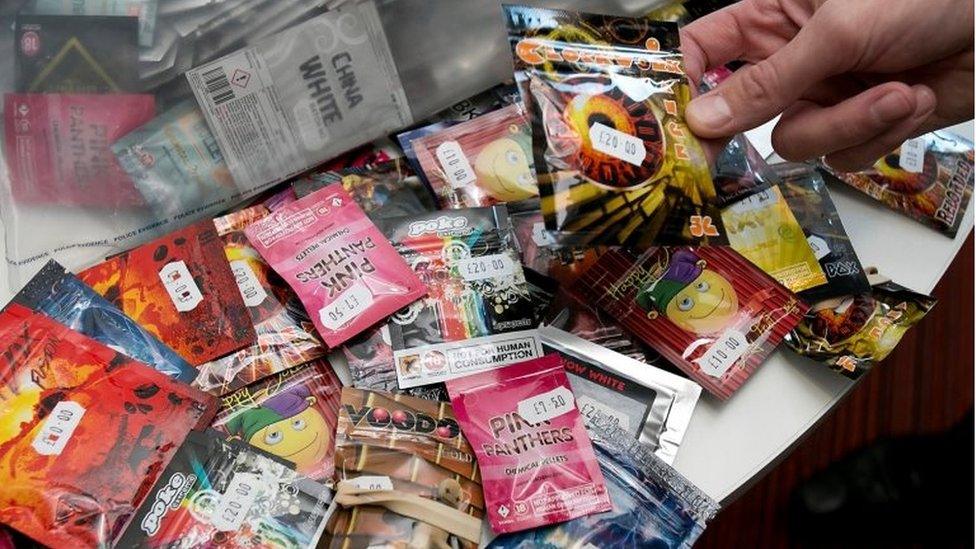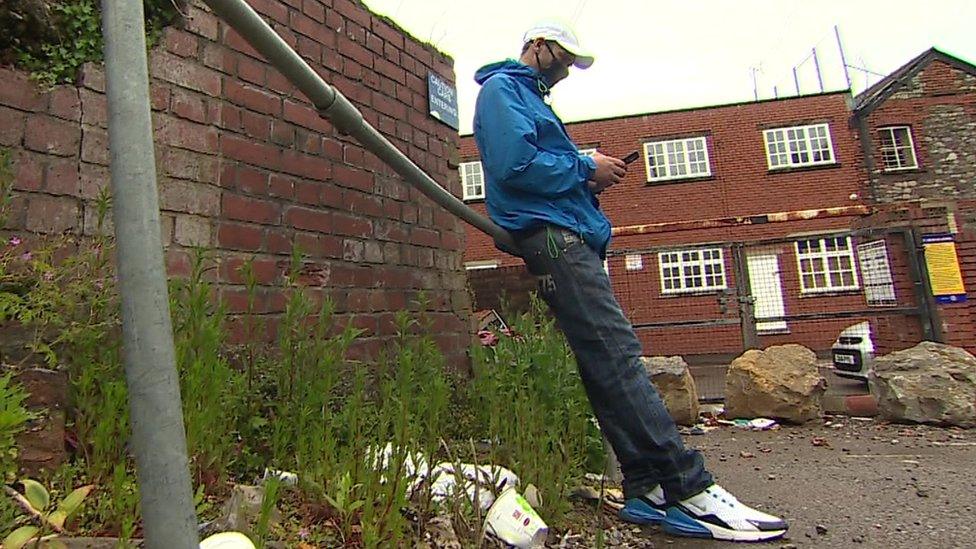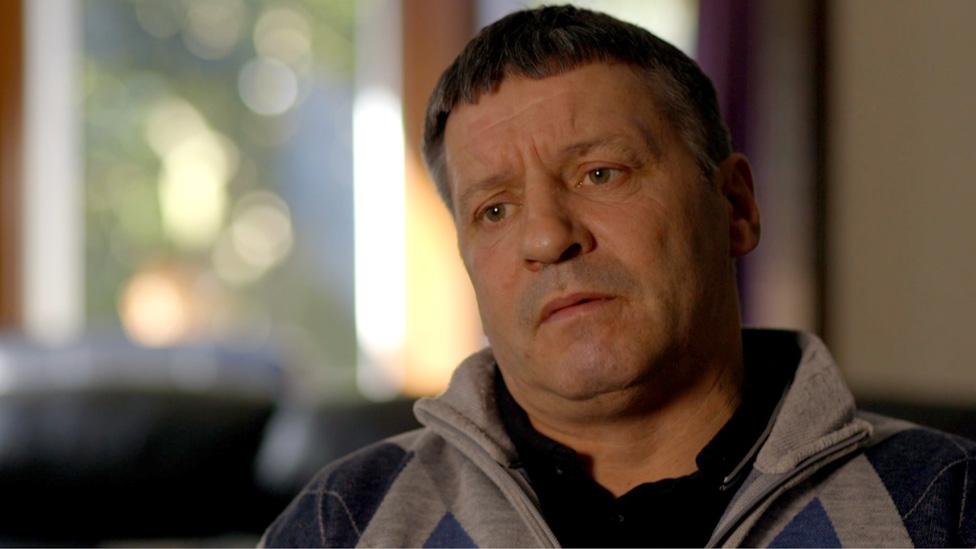Psychoactive drugs bought at 'click of a button' online
- Published

The substances mimic the effects of illegal drugs such as ecstasy and cannabis
Psychoactive drugs such as Spice are easier than ever to buy, despite a ban which came into force five years ago, drugs charities have warned.
They said trade had gone to the dark web, making them "more available" and "more dangerous" for problem users.
Since it became illegal to make, sell or supply such drugs, just 28 people have been convicted in Wales.
The Home Office said the new law had "eliminated" the open sale of drugs in shops and on UK-based websites.
The offence carries a maximum sentence of seven years in prison.
The drugs are known as new psychoactive substances (NPS), but used to be called "legal highs".
Data obtained from Welsh police forces by BBC Wales under the Freedom of Information Act showed 124 arrests were made in the past five years, leading to 86 charges and 28 convictions.
Former North Wales Police and Crime Commissioner Arfon Jones said psychoactive substances were "under the radar", with enforcement more concentrated on heroin and cocaine.
Mr Jones, who is also a campaigner on drugs, believes the legislation is counter-productive and the UK should look to decriminalisation.
"Psychoactive substances is very much a problem in two countries, the UK and Turkey," he said.
"Look at the Netherlands, where they decriminalised cannabis many years ago, would Spice and mamba be a problem in the UK if we decriminalised cannabis 30 years ago? I think not."
Craig uses the drop-in centre but said it is hard to kick the Spice habit
Drugs charity Kaleidoscope said the legislation had "failed in its first objective to reduce harm" because the number of users in Wales had not gone down.
Chief executive Martin Blakebrough said it had made the job of drug agencies more difficult as - before the ban - new psychoactive drugs were being sold openly in head shops.
He said if a "bad batch" of drugs was causing overdoses or deaths, sellers could be warned to take them off the market.
The legislation has "driven this market underground, but also made it incredibly accessible", he added.
He said hundreds of anonymous websites, mainly linked to large manufacturers in China, were selling directly into the UK market so, with the "click of a button, the postman will deliver these drugs to you within 24 hours, causing people who have problems with drugs more significant issues".
Mr Blakebrough called the legislation "purely a publicity stunt to show the UK government was doing something".


Nicky Lane has experienced the impact substances such as Spice have on lives
Nicky Lane, 40, from Newport, struggled with an addiction to Spice for three years and ended up living on the streets before being sent prison.
He said even after it was made illegal it was "easy to get a hold of and quite cheap" but as his addiction worsened he was spending up to £40 a day.
Nicky said Spice was being smuggled into prison, with a liquid form being sprayed onto personal letters to prisoners.
"I was having money sent to people that were selling it on the wing so as soon as the money landed your Spice landed," he said. "So it's as easy as that if you've got the money."
Nicky said Spice leaves people "totally out of it" so some homeless use it to numb themselves from the pain and boredom of life on the streets.
He said Spice "ripped away everything" from his life and he warned people to "leave it alone".
He added: "I believe they made the right decision in banning it because it's one of the worst drugs out there, but for people addicted it's hard."

Mr Blakebrough added: "But let's be honest, when we saw the scenes of Spice being used in Wrexham, for example, you know where people were zombies - I mean that terrified local communities, much more than if you're selling it from a head shop.
"America is now legalising cannabis and, across Europe, it's a similar picture.
"Britain is standing on its own by still saying the best way of controlling drugs is by hitting people with legal sanctions when the evidence doesn't show that is effective and we've got the highest drug-related deaths in Europe.
"I don't want to see a free-for-all of drugs in our streets, but what we need to do is regulate it."
Figures from the Office for National Statistics indicated there were seven deaths in Wales involving an NSP in 2019, nearly as high as the eight deaths in 2015, a year before they were banned.
NPS deaths made up just over 3% of the 240 drug-related deaths in Wales in 2019, below the number caused by opiates (121), cocaine (30), benzodiazepine (22), amphetamine (12) and Ecstasy/MDMA (8).
The drug analysis laboratory in Cardiff, Wedinos, said most NPS deaths were now linked to Spice.
Public Health Wales' head of substance misuse, Josie Smith, said making psychoactive substances illegal had deterred some users.
She said substance missuse also needed to be treated as a "health issue" with problem users quickly identified and given help.
"We are now in a global borderless environment in terms of the manufacturing and transport of drugs, and psychoactive drugs, particularly," she said.
"We need to address the challenges to that in a much more holistic way."
The Home Office said the UK government was committed to preventing drug use in communities, including tackling the supply of illegal drugs.
A spokesman added: "Since the Psychoactive Substances Act, external has come into force, hundreds of suppliers have been arrested and convicted, retailers have either stopped selling psychoactive substances or closed down and action by the National Crime Agency has resulted in the removal of psychoactive substances being sold by UK-based websites."
Related topics
- Published16 July 2018

- Published26 May 2016
